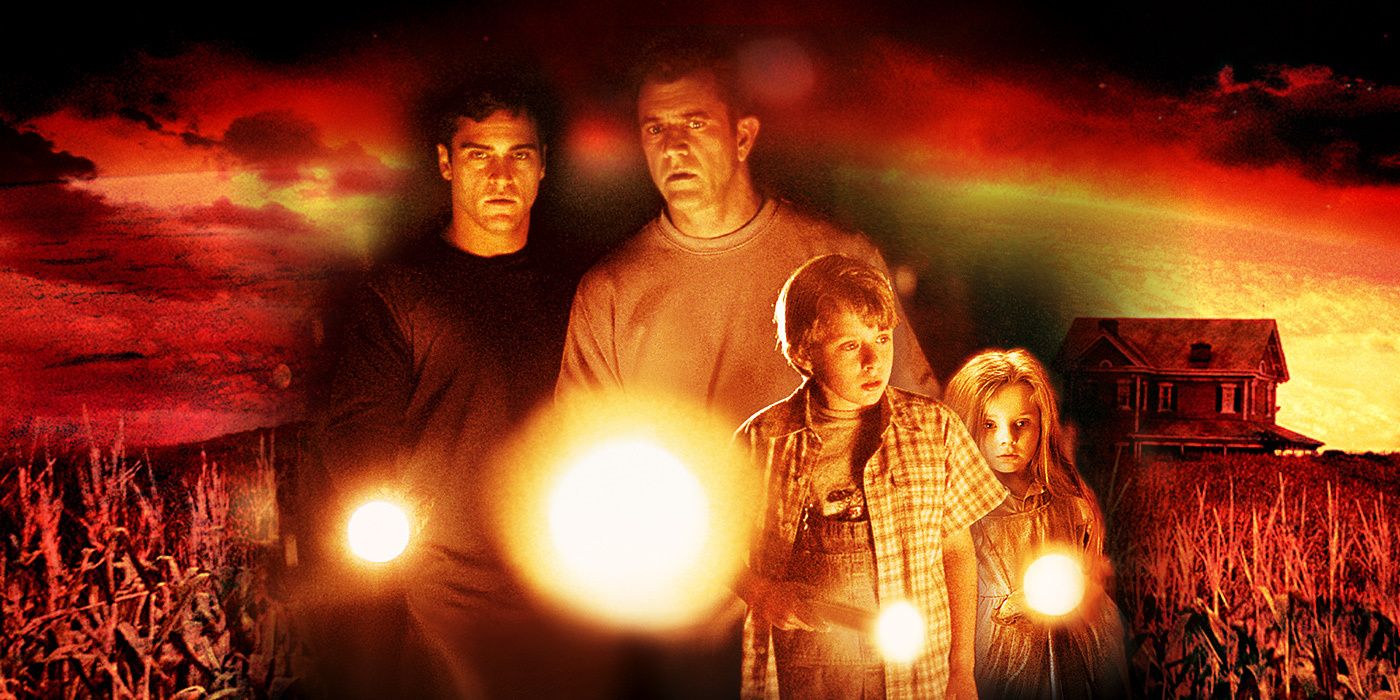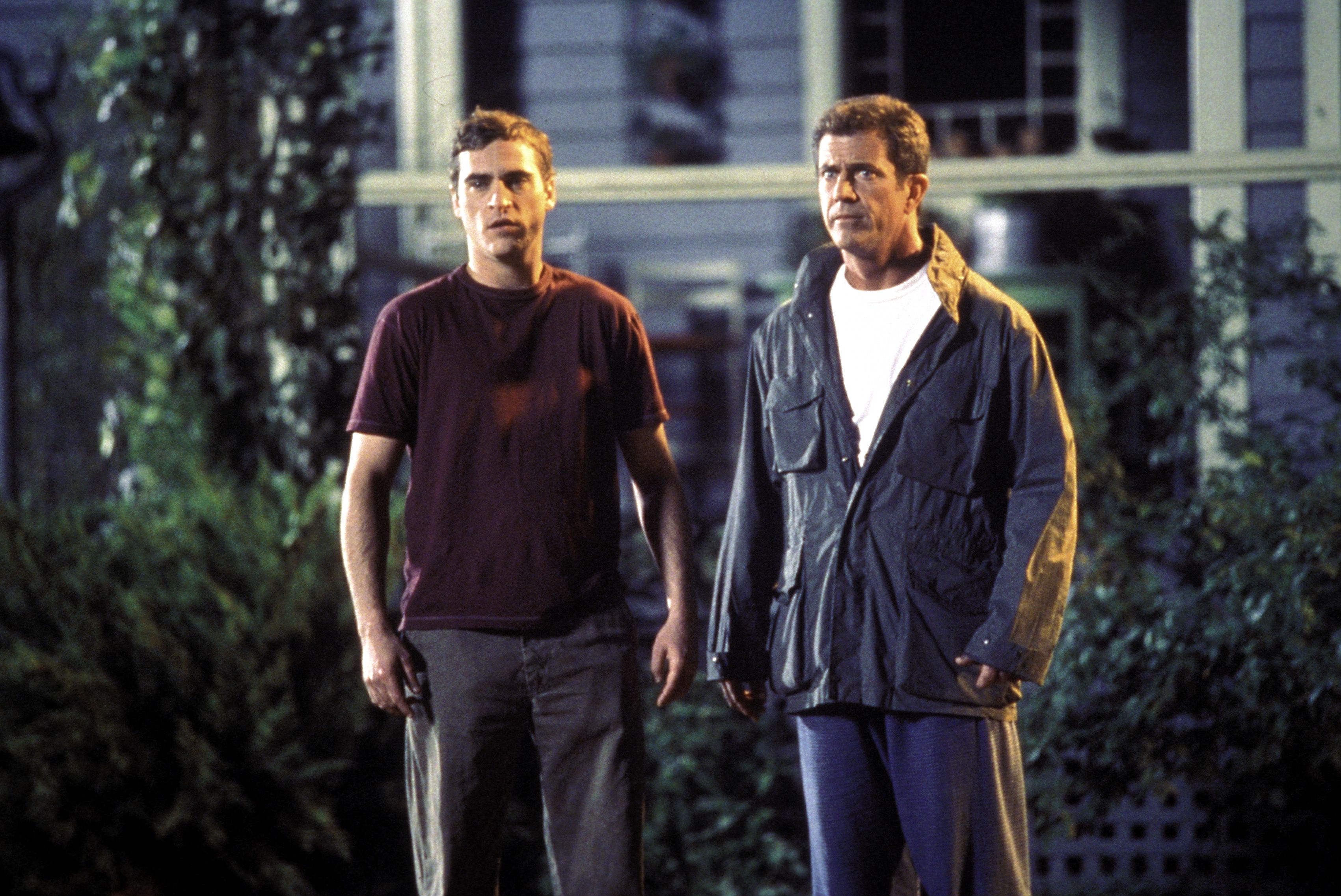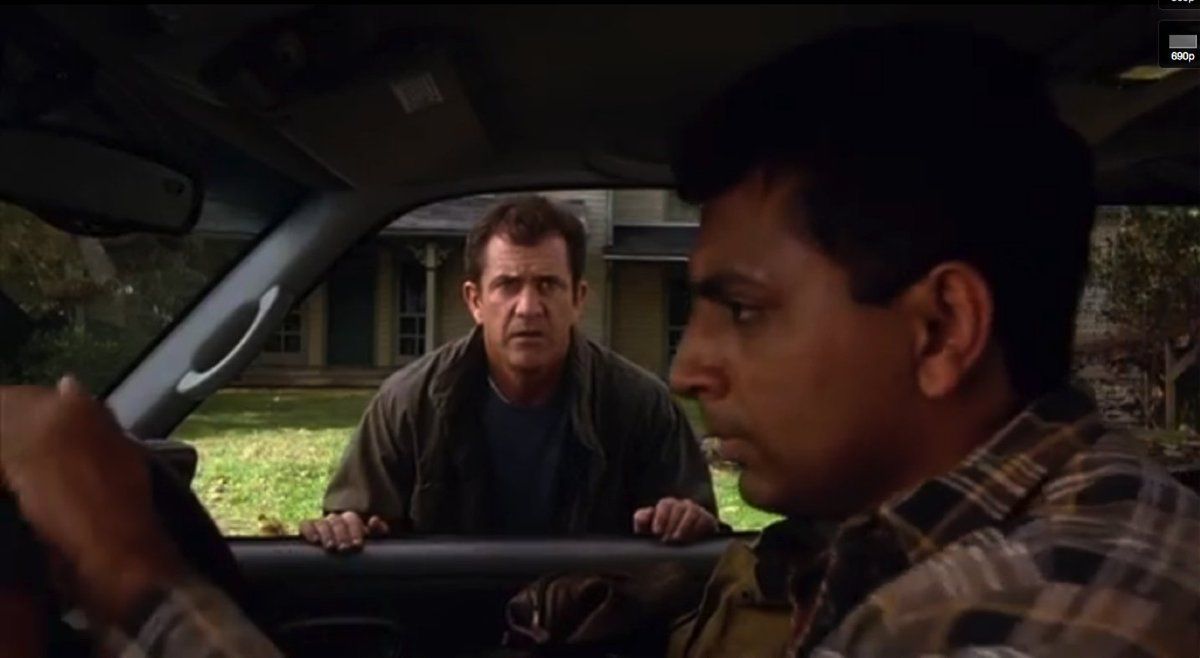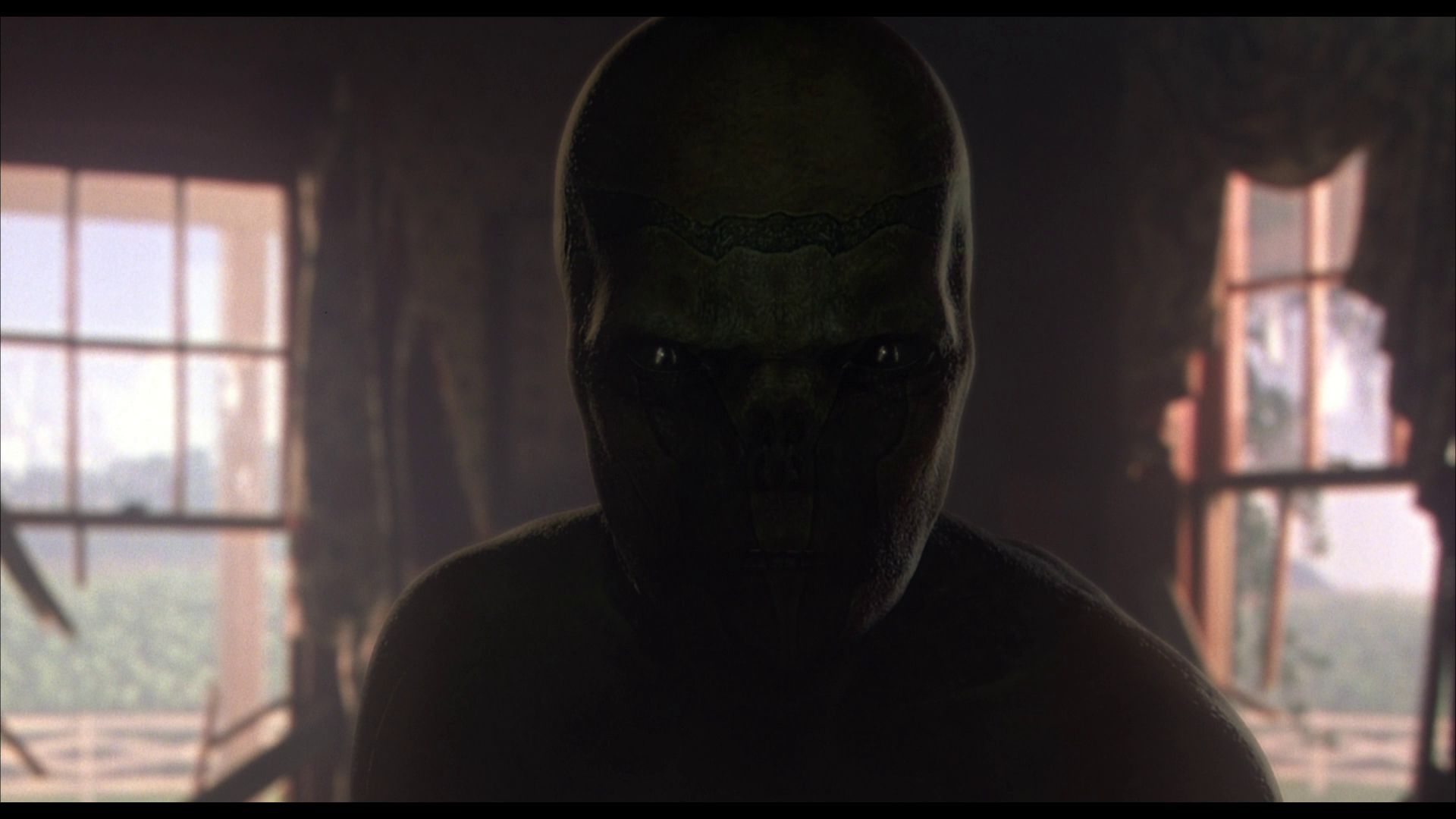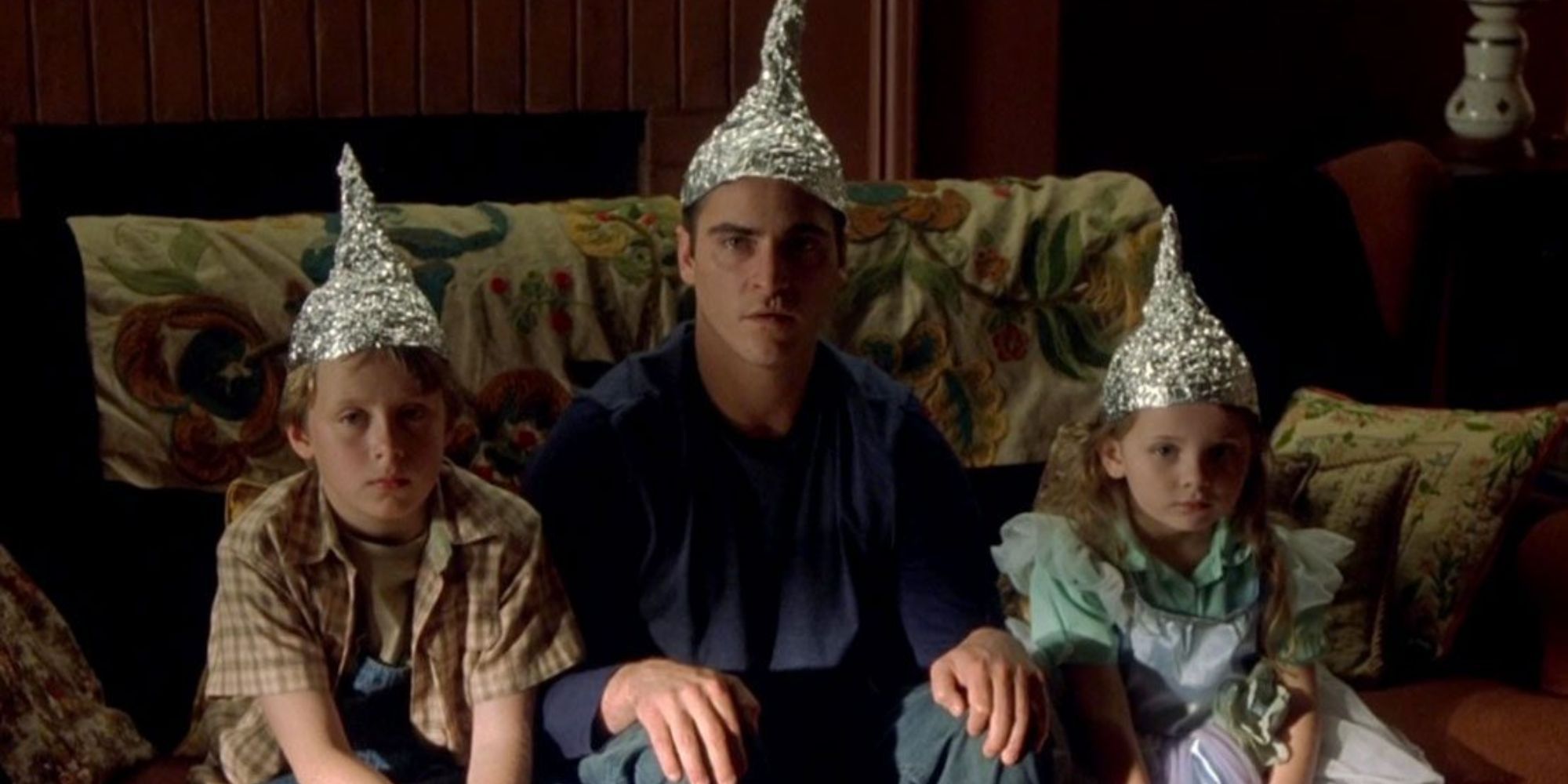It's been 20 years since M. Night Shyamalan released his alien invasion horror film Signs, and to this day it's still regarded as one of his absolute best. Be it the inspired casting, the strange extraterrestrial phenomena, or the eerily dramatic score by legendary composer James Newton Howard, there's a lot to love about this sci-fi thriller. Like Shyamalan’s other greatest works, Signs feels deeply personal, and it's obvious why. While the alien invasion backdrop provides some exciting dramatic conflicts, the soul of this film is undoubtedly the former Episcopalian priest Graham Hess (Mel Gibson) and his struggle with the deconstruction of his own faith. Graham’s battle through his own personal apocalypse, as the world goes through one of its own, is the film’s strongest beat, with themes ranging from grief itself to divine providence and the influence of demons along the way.
Although Shyamalan attended different Catholic and Episcopalian schools in his youth, he's never identified himself as a Christian, yet the way he interprets the ancient faith tradition for the screen is powerful. The film's star Gibson is a devout Roman Catholic, which no doubt influenced his portrayal of the tortured priest, and his own directorial works such as The Passion of the Christ and Hacksaw Ridge stand out as landmark interpretations of the faith. Yet, Shyamalan's work on Signs stands out due to the ways in which the tensions between faith and doubt are highlighted. Rather than focusing purely on one or the other, the film weaves them together seamlessly, and while we only see bits and pieces of the larger product as the events unfold, on the other side of the credits we're able to see everything for what it was meant to be.
From the moment we first see Graham, we see a man who has lost any meaning or purpose, especially after leaving behind his clerical collar. Even his brother Merrill (Joaquin Phoenix) and his children, Morgan (Rory Culkin) and Bo (Abigail Breslin), aren’t enough to overcome his weariness as he wanders aimlessly through his days. He's removed any mention of God from his home, including the crucifix that used to hang on his wall, and prayer is seemingly banned as well (as we see in the “last supper” scene). Throughout the film, Graham is continually reminding folks that he’s not a Reverend anymore. In attempting to shed his role as a spiritual shepherd, not to mention his relationship with God, he's completely lost himself.
This is especially seen in the most important scene in the film, one that perfectly encapsulates the journey Graham finds himself on. After the revelation that extraterrestrials have arrived on Earth, Merrill asks his brother for comfort, the same way that he used to give it to his congregation. After a brief sermon about the two different kinds of people in the world, Merrill is comforted by the idea that everything happens for a reason, deciding that he’s a “miracle man” after all. Although it seems like Graham has encouraged his brother to faith at first, the scene quickly takes a dark turn, a shadowy reflection of the state of Graham’s soul.
After Merrill asks Graham about his own views on signs and wonders, the former priest answers by saying, “there’s no one looking out for us, Merrill. We are all on our own.” Having cited the sudden death of his wife as his evidence, Graham has decided that regardless of the miraculous nature of learning we aren’t alone in the universe, the truth is that we are. Of course, what Gibson’s character struggles with isn’t anything new. If death comes for us all, then so must grief. The loss of his wife has traumatically affected him (especially given the way in which she died), and because of that, he isn't sure how a good God could ever allow such suffering and would sooner not believe in the Higher Power at all.
After losing his own wife, author and theologian C.S. Lewis, known best for The Chronicles of Narnia series, wrote in his memoir A Grief Observed that “No one ever told me that grief felt so much like fear.” Here, Lewis equates mourning to a type of anxiety, and Signs supports this notion. Graham’s recurring flashbacks to the night of his wife’s death haunt him at crucial moments throughout the film (including after his miracle conversation with Merrill). Shyamalan wisely juxtaposes these anxiety-inducing moments with the immediate threat of alien occupation, putting the audience on edge while also explaining why Graham is so adamantly opposed to the idea that “the truth is out there.” As Graham battles fear, he all-too-often seems to lose, and each loss makes him all the angrier.
It’s not until Graham confronts Ray Reddy (played by Shyamalan himself), the man who accidentally killed his wife, that the former minister is able to face his grief head-on and effectively begin to overcome his fear. Ray’s repentance, broken by his role in making Graham lose his faith, changes the former priest’s outlook, giving him the courage to investigate the alien phenomenon for himself. Upon discovering the extraterrestrial involvement in the recent events, such as the crop circles (which, interestingly, his own son thought were made by God), Graham returns home with a new desire to fix what's been broken. Unfortunately, Graham still hasn’t dealt with his own anger, though Shyamalan makes it clear that Ray Reddy is not the man who Graham angrily blames for the death of his wife; he blames God himself.
Shyamalan knows exactly what he's doing here, mixing the former Reverend's grief and anger — two things that often blend together – with issues of divine providence. Even Ray Reddy admits that what happened to the Reverend’s wife felt like it was “meant to be,” which of course Graham cannot accept. Yet, near the film's end, as the Hess family hides in their basement from the alien invaders, this begins to change as these complex concepts intersect. Morgan’s asthma attack forces Graham to comfort his son by lulling him back into normal breathing rhythms, and what feels like a beautiful moment between father and son, with Graham and Morgan finally coming to an understanding with each other, is abruptly cut short when Graham flat-out curses God. After months of hiding from Heaven, he finally acknowledges the Almighty and admits that he hates him for what his family has gone through. It’s a quick moment, but it’s raw and honest in the best of ways.
As the master artist he is, Shyamalan reveals this confession at a critical moment in what seems at first to be the climax of Signs. Of course, it isn't, and after the Hess family returns upstairs, Morgan is snatched by an alien. As it turns out, it’s the same creature that Graham was afraid to face at Ray Reddy’s house earlier, the demon in the pantry that he only sort of dealt with. It's here that the memory of his wife's final moments returns to him, juxtaposed with the words he spoke to Merrill about miracles. In a moment of pure desperation, Graham acknowledges the divine and makes a choice to respond accordingly. Although the creature had sprayed an alien pathogen on Morgan, Graham rushes his son outside and away from harm. It's here that the former minister mutters his first prayer in months — “his lungs were closed, no poison got in” — and within moments, his plea is answered. When Morgan wakes up, he asks if someone saved him, to which Graham, his faith now restored, replies, "I think someone did."
As Lewis stated in A Grief Observed, “You never know how much you really believe anything until its truth or falsehood becomes a matter of life and death to you.” This quote perfectly encapsulates Graham's journey throughout Signs, and with it in mind, helps us to better understand the weight of the deconstruction, and ultimately reconstruction, of the minister’s faith throughout the film. By returning to the church and recommitting his life to Christ, Graham deals completely with his grief, overcomes his anger, and acknowledges that even when we don’t see it for ourselves, God has a greater plan than our own.
But Graham's journey isn't the only way in which Shyamalan weaves issues of faith into his alien invasion masterpiece. While it's easy to dismiss the aliens as simply being plot devices for Graham's character arc (and certainly that’s part of it), they're a bit more layered than you might’ve initially thought. Many believe that the aliens in Signs are actually manifestations of demonic entities. No doubt this seems a bit farfetched at first, but when this is explored considering the film's events and the previously associated spiritual themes, it begins to make some real sense.
Time would fail us to talk about how the Hess’ dogs don’t act up until the crop circles appear, turning violent and rabid as if they were possessed, similar to when the demons in the Gospels are cast out of a man and instead take over the bodies of pigs (Mark 5:1-20, Luke 8:26-39), or about how, if you look closely, the crop circles actually look like a pitchfork (often associated with the Devil in pop culture). Beyond that, the first time the aliens make vocal contact with the Hess family is via Bo’s old baby monitor, which feels like something out of Poltergeist or The Conjuring. As a horror director himself, Shyamalan uses various Hollywood horror tropes classically associated with demonic spirits to make the aliens feel all the scarier — reminiscent of demons — and it works like a charm.
The alien’s weakness being water is also significant since water is a source of life. In Scripture, Christ is called the "living water," and he even commands his disciples to baptize others "in the name of the Father, the Son, and the Holy Spirit" (Matthew 28:19-20). This isn't even to mention that being a priest, Graham's home could be considered holy ground too, effectively consecrating all the water on their land. It's no wonder that Merrill defeats the creature so easily! The creature’s own motives also come into play here too, as they seem much more concerned with gathering individual people - almost like they're harvesting souls - than they are with actually conquering the entire planet.
One thing that's often overlooked, however, is that Morgan believes that the aliens can "know our secret thoughts." Considering this, the night Bo woke up from her nightmare (which involved Morgan dying) just so happened to be the same night that Graham saw the alien from outside her window. This isn't even to mention the nigh-prophetic painting from Morgan's alien book, which features Graham and his children dead outside their burning home. We know that demons are supposed to prey upon our own fears and failures, and there's no doubt that the aliens in Signs attempt to do the same. We see this clearly when Graham visits Ray Reddy's house at the beginning of the film, only to run away from the demon he has locked in the pantry. It's only at the film's end that Graham can finally confront his own fears, and his own demons, head-on.
If Signs is about anything it’s about the possibility of miracles, be them signs and wonders in the stars or what we believe to simply be “coincidences” here on Earth. Even after 20 years, M. Night Shyamalan’s sci-fi horror classic has managed to stay just as relevant as ever, and it’s clear why. Because of this, the aptly titled Signs feels a lot more down-to-earth and human rather than overtly reverent, constantly pushing us to discover which type of person we are, “… the kind that sees signs, that sees miracles? Or do you believe that people just get lucky? Or, look at the question this way: Is it possible that there are no coincidences?” We must decide for ourselves.

